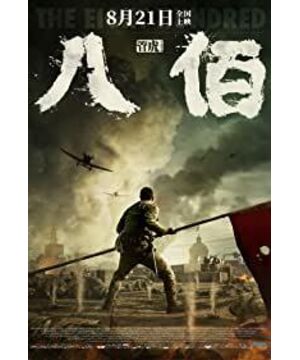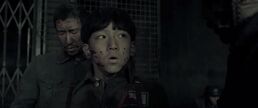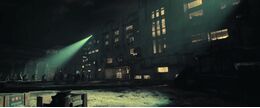1. I don't understand technology, but I also think that the technology is very good. The perspective of water, land and air is fully used, and the airship is really burning when it comes out. There are the convergence of various forces, various voices, various races, and the undercurrent of intertwined life, all of which are carefully expressed. The ambition of the film is obvious, using a small fixed space as the incision, which is deeply drawn. , also scans the panorama and dynamics of a war. 2. The role of Mr. Fang played by Xin Baiqing is not obvious. He went to communicate with the Japanese Marine Corps in the first place, and later traded with European and American observers. In the end, he seemed to be a reporter stationed in the Sixing Warehouse. He was curious about his true identity. ? 3. The ending of the film is too hasty, and there is no one who has a leisurely tail to end, calm and accommodate the tense climax process. In the end, several towers in Pudong came out really a failure. It is estimated that it was a correction and compromise made to pass the trial. 4. The visual contrast between the two sides of the Su River is very good. For the defenders of Zhabei, the film uses a method of deep drawing based on individual characters. For the peaceful atmosphere of the concession on the other side, the film uses group image scanning and snapshot capture. , but this binary contrast seems too stark, and the public concessions in the autumn and winter of 1937 were not so colorful. 5. In Lu Chuan's "Nanjing, Nanjing", the hero Nakaizumi who played the Japanese soldier with conscience and self-blame, "grow up" and "transformed" into a real spokesperson for war machines in "Yao Bai", which is quite embarrassing. Of course, Lu Chuan uses a humanitarian perspective, and has a reflective warning to the logic of civilization itself, while Guan Hu's appeal is not here, he is more "political" and seems to be more "China". I don't know if Guan Hu used Zhongquan Hero to play this role, whether he wanted to talk to Lu Chuan. 6. For the visual expression of Shanghai's imagination, why do Shanghainese-speaking middle-class wives always wear cheongsams to play mahjong, and always talk about everything happening around them in a sarcastic tone that doesn't matter to them? Scanning of Shanghai citizens in several films seems to have become a stereotype. There were many types of women in pre-war and wartime Shanghai, even if they were family wives. 7. The meeting of local dialects gives people a sense of excitement, and a generality that mobilizes the overall situation is depicted by specific sounds and intonations, and it also shows the current situation in Shanghai that affects the whole body. 8. In the face of the specific historical situation, the universalist humanitarian concern is likely to be "ineffective". In this sense, "nationalism" seems to be a more real and personal concern that can cover the so-called "universal humanity". It is the "truth", and even the "truth" that has to be confronted and involved in the urgent history. It's easy and cool to criticize this easily, but the meta-perspective and smug moral prejudice don't seem to move people's hearts. 9. The sound, light, color and shadow on the other side of the Su River evoked a desire, that is, after the war, what was the daily life of Shanghai’s isolated island and citizens during the occupation period, and how to extend it? That is, when Xie Jinyuan worked hard to break through the blockade of the Japanese army and arrived at the concession, if there was still 147 minutes to explain their whereabouts and living environment, as well as the outline of the life of the citizens on the other side of the Su River, various political forces With intricate undercurrents surging, how will the movie be made? So I can't wait to see the release of Lou Ye's "Lan Xin Grand Theater", and I want to see how he shoots the urban cosmopolitan style in Hengguang Riichi's "Shanghai". The presentation of Shanghai sensibility.
10. Writing these words, I am deeply aware of the “reform” of my thinking by that garden in Beijing. Although I vaguely resist and want to keep a distance, the effect of the reform seems to be obvious. If it were a few years ago, when I was still a literary youth, I probably wouldn't have liked this film very much, but I would have liked Lu Chuan's "Nanjing, Nanjing" more. 2020/8/14 After watching the movie in Wujiaochang
View more about The Eight Hundred reviews











